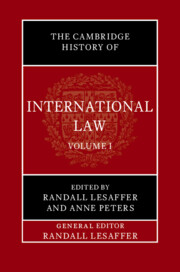Book contents
- The Cambridge History of International Law
- The Cambridge History of International Law
- Frontispiece
- The Cambridge History of International Law
- Copyright page
- Contents
- Plates
- Tables
- Contributors
- Preface
- 1 Scope, Scale and Humility in the History of International Law
- Part I The Historiography of International Law
- Part II The Historiography of International Law
- 6 The Historiography of International Law in East Asia
- 7 The Historiography of International Law in Sub-Saharan Africa
- 8 Historiography of International Law on the European Continent
- 9 The Historiography of International Law in Russia and Its Successor States
- 10 ‘The Most Neglected Province’
- 11 The View from the US Leviathan
- 12 Using History in Latin America
- Index
- Plate Section (PDF Only)
- References
11 - The View from the US Leviathan
Histories of International Law in the Hegemon
from Part II - The Historiography of International Law
Published online by Cambridge University Press: 06 December 2024
- The Cambridge History of International Law
- The Cambridge History of International Law
- Frontispiece
- The Cambridge History of International Law
- Copyright page
- Contents
- Plates
- Tables
- Contributors
- Preface
- 1 Scope, Scale and Humility in the History of International Law
- Part I The Historiography of International Law
- Part II The Historiography of International Law
- 6 The Historiography of International Law in East Asia
- 7 The Historiography of International Law in Sub-Saharan Africa
- 8 Historiography of International Law on the European Continent
- 9 The Historiography of International Law in Russia and Its Successor States
- 10 ‘The Most Neglected Province’
- 11 The View from the US Leviathan
- 12 Using History in Latin America
- Index
- Plate Section (PDF Only)
- References
Summary
Histories of international law more or less follow the epistemic position of the jurisdiction in which they arise. The parochial anglophone student of the comparative literature in the history of international law instantly sees a version of this phenomenon in action. With notable exceptions, even sophisticated work in the history of international law in the US is importantly different from English-language work in the same field that has begun to pour out from scholars based in the UK, Australia, New Zealand, Canada and elsewhere. In this chapter, I propose that this is because US scholars since at least the Second World War have taken up the history of international law through a set of questions and presuppositions structured by a standpoint inside the leviathan. The most powerful player on the international stage – the United States – has exerted a gravitational pull on scholars writing the history of international law and on the functions that such histories serve. In recent years, however, the cross-border professionalisation of the field is helping produce histories increasingly further afield from, or at least in a newly complex relationship with, the epistemic domination of the hegemon.
- Type
- Chapter
- Information
- The Cambridge History of International Law , pp. 330 - 377Publisher: Cambridge University PressPrint publication year: 2024

